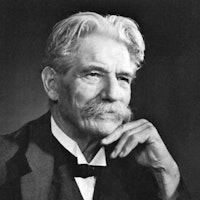Something within us does not pass away, something goes on living and working wherever the kingdom of the spirit is present.
Albert Schweitzer

To Reach Life By Overcoming Death
Topic: Life Beyond Death & the Spirit World
The man who dares to live his life with death before his eyes, the man who receives life back bit by bit and lives as though it did not belong to him by right but has been bestowed on him as a gift, the man who has such freedom and peace of mind that he has overcome death in his thoughts—such a man believes in eternal life because it is already his, it is a present experience, and he already benefits from its peace and joy. He cannot describe this experience in words. He may not be able to conform his view with the traditional picture of it. But one thing he knows for certain: Something within us does not pass away, something goes on living and working wherever the kingdom of the spirit is present. It is already working and living within us, because in our hearts we have been able to reach life by overcoming death.
Albert Schweitzer was born on January 14, 1875, in Kaysersberg, Alsace, into a family deeply rooted in the traditions of religion, music, and education. Both his father and maternal grandfather were Lutheran ministers, and his early exposure to church life, theological study, and classical music shaped his intellectual and spiritual development. He pursued theology and philosophy at the University of Strasbourg, earning a doctorate in philosophy in 1899 with a focus on Immanuel Kant’s religious thought. In 1900, he received his licentiate in theology. His academic and pastoral work during this period included preaching at St. Nicholas Church and serving in leadership roles at the Theological College of St. Thomas. In 1906, he published The Quest of the Historical Jesus, a critical work that contributed to modern theological scholarship.
Alongside his theological and philosophical work, Albert Schweitzer was a gifted musician. He began studying piano and organ in childhood and was performing publicly by the age of nine. He went on to become an internationally known concert organist, using income from performances to fund both his education and later medical missions. As a musicologist, he published a biography of Johann Sebastian Bach in 1905 and contributed to the study of organ building and playing. In 1905, he made a pivotal decision to study medicine with the goal of becoming a medical missionary. He earned his medical degree in 1913 and soon after established a hospital in Lambaréné, French Equatorial Africa, where he and his wife later endured internment during World War I.
After returning to Lambaréné in 1924, Albert Schweitzer dedicated the remainder of his life to expanding and maintaining the hospital, which grew into a complex capable of treating hundreds of patients. He combined the roles of physician, surgeon, pastor, administrator, writer, and host, drawing on his wide range of training and experience. His written works during this time included On the Edge of the Primeval Forest and Civilization and Ethics. Schweitzer received several international honors, including the Goethe Prize and the 1953 Nobel Peace Prize. The prize money supported the establishment of a leprosarium at Lambaréné. Albert Schweitzer died there on September 4, 1965, leaving behind a legacy grounded in service, scholarship, and what he called “Reverence for Life.”
Reverence for Life
Schweitzer, Albert. Reverence for Life. Harper & Row, 1969, [Albert Schweitzer, Reverence for Life].

Albert Schweitzer
Theme: Life Beyond Death

About This Albert Schweitzer Quotation [Commentary]
Albert Schweitzer’s words, “Something within us does not pass away, something goes on living and working wherever the kingdom of the spirit is present,” highlight the enduring nature of the spirit beyond physical death. In his reflections, Schweitzer encourages us to view life as a gift, something not ours by right but given to us. By living with an awareness of death, we can appreciate life more deeply. Life, in this sense, is not something to possess but to receive with gratitude, which brings a sense of freedom and peace that transcends fear of death.
Schweitzer presents eternal life as something we can experience now, not just in the future. To “overcome death in our thoughts” means moving beyond the fear of mortality, enabling us to live fully in the present. This belief in eternal life, for Schweitzer, is real and felt in the peace and joy it brings. It is not an abstract concept but a lived experience, rooted in the awareness that the spirit within us continues to live and work when we align ourselves with the kingdom of the spirit.
Schweitzer’s view of “life beyond death” is spiritual but also grounded in everyday life. The kingdom of the spirit is present when we live with reverence for life. That which does not pass away is not just an idea, but a living force within us, revealed when we consciously live with this spiritual understanding. Schweitzer reminds us that overcoming the fear of death allows us to connect with a part of ourselves that continues to live and influence the world.
Additional Albert Schweitzer Quotes
Albert Einstein’s commentary about his friend Albert Schweitzer
Related Quotes
Copyright © 2017 – 2025 LuminaryQuotes.com About Us